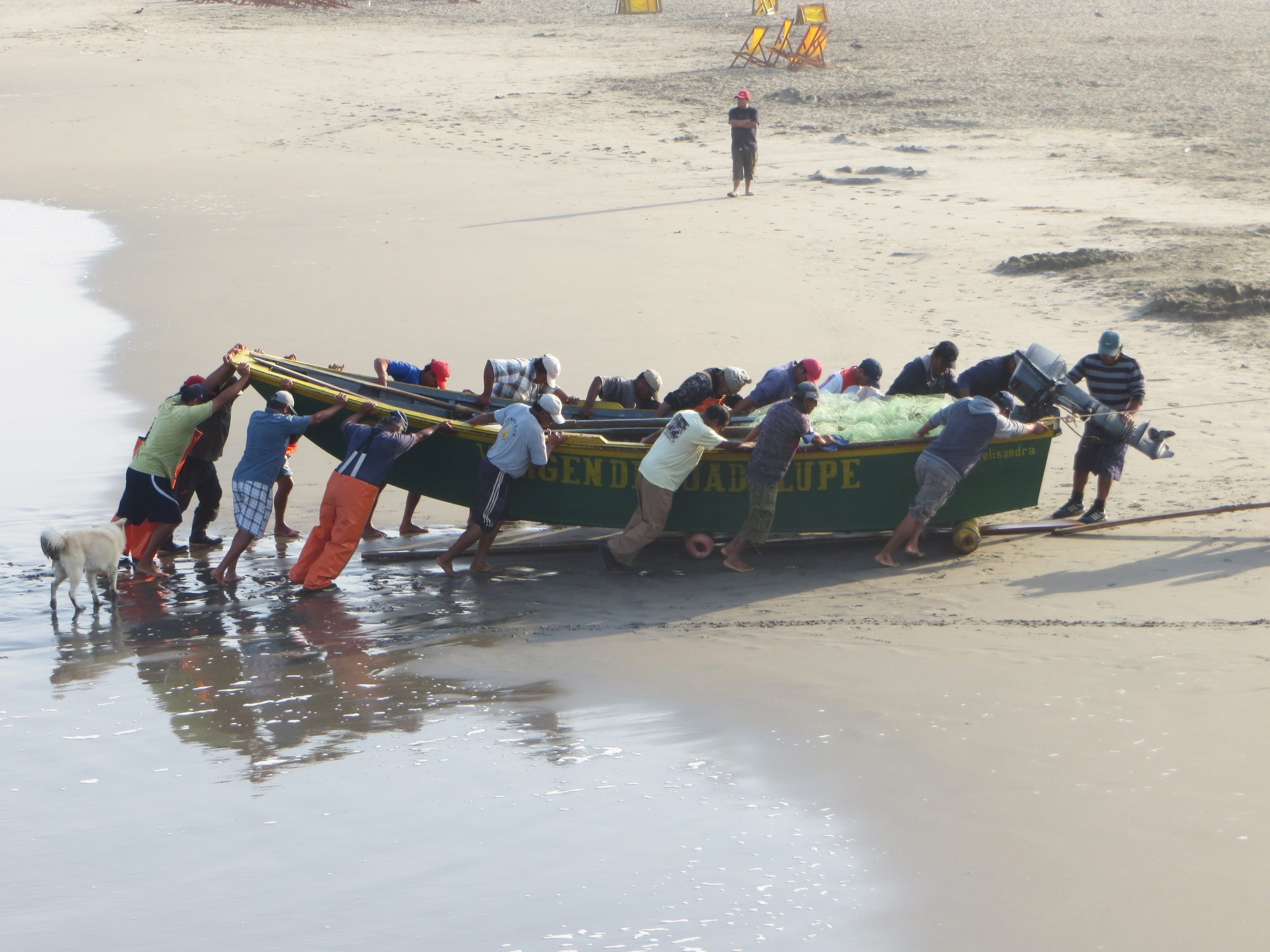
Most people work on land. Unless rocked by an earthquake, their work stations remain still. Not so for fishers. Their entire work platform rocks and rolls ceaselessly. Non-fishers cannot imagine the risks they face. Fishers work in unique conditions. There are no regular hours. On-board accommodation can be extremely cramped and unhealthy.
The difficulties don’t end when the catch is landed. Fishworkers include those in the harbours; those who process the fish and carry out post-harvest activities; those who work these into markets. Even though women carry out these activities—some even more than men—their contribution is undervalued. They work in difficult conditions, without healthcare or decent facilities, facing violence and harassment.
Trade union membership is low. Which means labour standards and legal frameworks, like those laid down by the International Labour Organization (ILO) to protect fishers, are often not to their benefit. There are also concerns worldwide about forced labour, human trafficking and exploitation of migrant labour.
ICSF has, since its inception in 1986, worked to improve the conditions of work onboard fishing vessels through legal and policy interventions. ICSF has advocated for the inclusion of small-scale fishing vessels in the ILO Work in Fishing Convention C188, which lays down binding requirements concerning work on board fishing vessels, occupational safety, health and medical care at sea and ashore, rest periods, written work agreements. ICSF has worked in partnership with FAO and ILO to address child labour issues in fishing.

Engaging with the Decent work process related to the adopted Work in Fishing Convention (WFC), 2007 has been an important part of ICSF’s work. ICSF saw engagement with the ILO process as an opportunity to focus greater attention on issues related to the conditions of work in the small-scale fisheries sector, including aspects such as safety at sea, social security, and remuneration and recognition of shore -based workers, especially women.
The International Collective in Support of Fishworkers (ICSF) Trust and the Kerala Institute of Local Administration (KILA) jointly organized a Training and Capacity Development workshop at KILA, Kerala, India on...
This study aims to look at the situation of these migrant fishers to get a better understanding of their recruitment, living and working conditions on the one hand and to...
This report on the “Sub-regional Dialogue on Labour, Migration and Fisheries Management”, held at, Thailand, from 11 to 13 December 2013, highlights the issue of migrant labour on board fishing...
This guidebook is intended mainly to help those unfamiliar with the Convention and the working of the ILO and the ILC, gain some understanding of the relevant issues. In particular,...
ICSF Guidebook: Understanding the Work in Fishing Convention, 2007 English https://www.icsf.net/wp-content/uploads/2007/09/930.ICSF119.pdf Gujarati, Marathi, Telugu, Malayalam, Hindi, Odia, Tamil, Kannada
The document gives a detailed report of the presentations and discussions transpired in the workshop. It is also worth noting that the discussions at the workshop as well as the...
The conventions and recommendations adopted by the International Labour Organization (ILO) formulate minimum international standards of basic labour rights: freedom of association, the right to organize, collective bargaining, abolition of...
This study explores the status of Brazil’s social welfare system for the fisheries sector, from the point of view of democratization of access, the methodologies used and the extent to...
Since Sri Lanka’s independence in 1948, social welfare for the country’s fishing populations has been the responsibility of successive governments. During the latter half of the last millennium, the State...
This dossier puts together reports on workshops held to discuss this proposed standard, as well as analyses of social security measures for fishing communities in the small-scale and artisanal sector...
Climate change is already having serious impacts on the safety and health of workers in all regions of the world. Workers are among those most exposed to climate change hazards...
This revised version of the “Hard to see, harder to count” handbook provides an updated set of tools for the design, implementation, and analysis of quantitative surveys on the forced...
This report is the culmination of three years of research and investigations into the Indian shrimp sector, examining evidence of forced labor, living and working conditions for shrimp supply chain...
Small-scale fisheries in the Mediterranean and Black Sea Region represents a key segment of the fishing sector, accounting for the greatest part of the fleet in the region and more...
The report reveals a complex global employment scenario. It forecasts a slight increase in global unemployment in 2024, signalling emerging labour market challenges. The report highlights disparities between high and...
The Canoe and Fishing Gear Owners Association of Ghana and the partners of the MarCNoWA Consortium under the GMES and Africa Project have produced safety at sea videos for community...
Modern slavery is hidden in plain sight and is deeply intertwined with life in every corner of the world. Each day, people are tricked, coerced, or forced into exploitative situations...
WE, the Member States of the Association of Southeast Asian Nations (ASEAN) on the occasion of the 42nd ASEAN Summit chaired by the Republic of Indonesia; GUIDED BY the ASEAN...
Achieving gender equality at work. General Survey on the Discrimination (Employment and Occupation) Convention, 1958 (No. 111), the Workers with Family Responsibilities Convention, 1981 (No. 156), the Maternity Protection Convention,...
The report covers the extent and consequences of the labour market disruption caused by overlapping economic and geopolitical crises and analyzes global patterns, regional differences and outcomes across groups of...